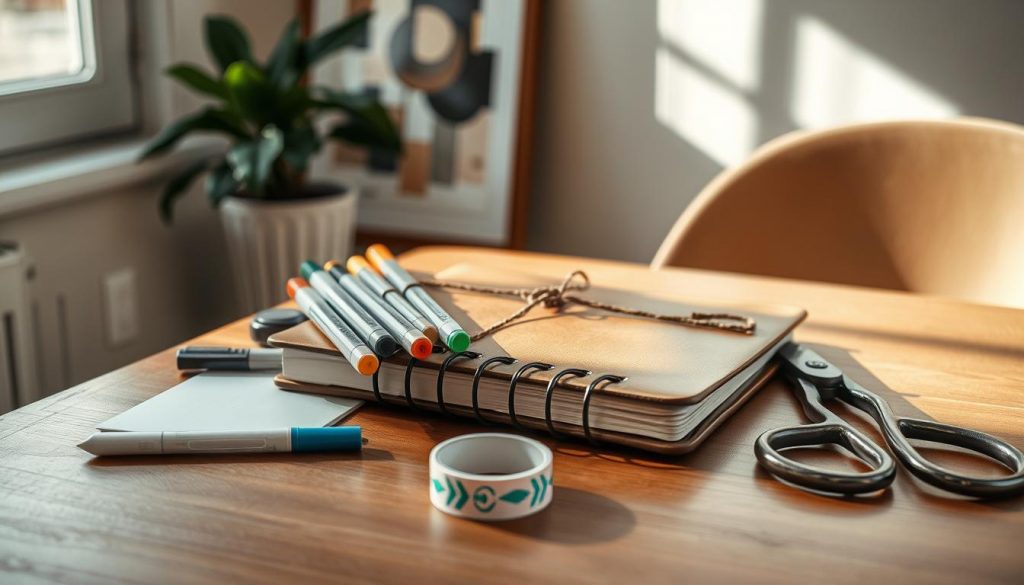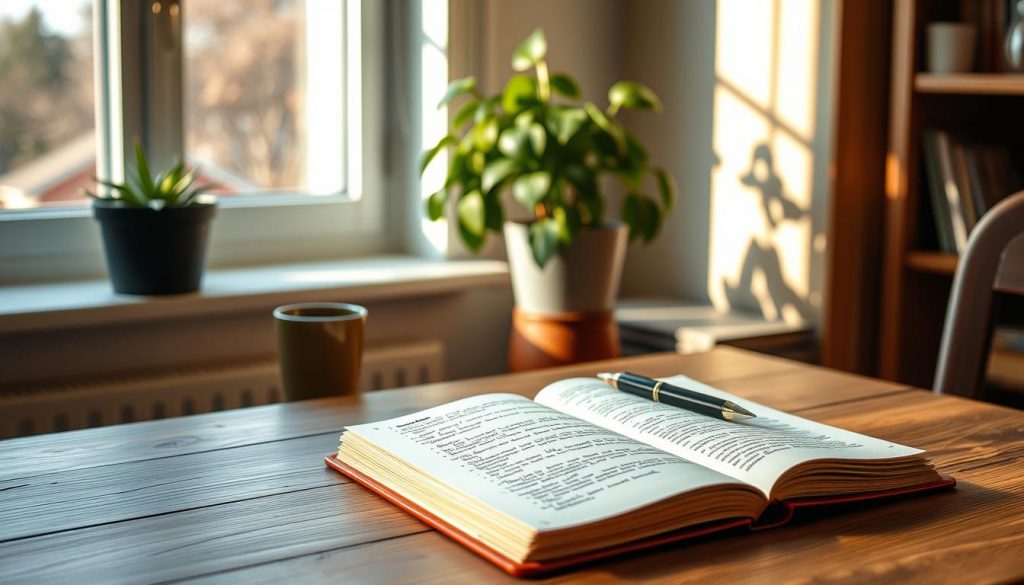Free journaling liberates you from traditional writing constraints. It’s a personal space where thoughts flow freely without judgment. This unstructured approach allows for spontaneous, unfiltered self-expression.
Spend just 1-3 minutes each morning exploring your innermost thoughts. Perfect prose isn’t the goal here. Instead, focus on connecting with your authentic self through writing.
Nobel laureate Daniel Kahneman believes this practice can change how you understand your thoughts. Great minds like Mark Twain and Ernest Hemingway used journaling for self-discovery.
Free journaling goes beyond traditional diary entries. It’s a dynamic way to explore your mind without limits. This practice can spark creativity, clarity, and personal growth.
The simplicity of free journaling is its strength. There are no rules or expectations. Research suggests it can reduce intrusive thoughts and boost mental well-being.
Ready to unlock deeper self-understanding? Let’s explore the world of free journaling together.
Understanding Free Journaling
Free journaling is a powerful method of spontaneous writing. It lets you explore your inner world without limits. This approach embraces unrestricted expression and personal discovery.
Journaling basics show it’s more than simple record-keeping. It’s a tool for emotional exploration and personal growth. Free journaling transforms your self-understanding in unique ways.
Definition of Free Journaling
Free journaling is an unstructured writing technique. You let thoughts flow naturally without judgment or structure. It allows complete freedom of expression.
- No strict rules or formatting requirements
- Complete freedom of expression
- Emphasis on authentic self-reflection
- Spontaneous writing without external pressure
The Philosophy Behind Free Journaling
“Writing is a powerful way to understand yourself and process complex emotions.”
Free journaling’s core philosophy centers on personal liberation through writing. Research supports its incredible benefits. It creates a safe space for genuine self-exploration.
| Benefit | Statistical Impact |
|---|---|
| Stress Reduction | 70% participants reported reduced stress |
| Emotional Clarity | 50% decrease in negative emotion intensity |
| Self-Awareness | 33% improvement over three months |
The practice encourages writing without filters. Your authentic thoughts and feelings emerge naturally. Free journaling connects you with your inner self.
It transforms personal reflection into a powerful tool. This enhances your mental and emotional well-being. Start your journey of self-discovery through free journaling today.
Benefits of Free Journaling
Free journaling can transform your life. It boosts personal growth and emotional wellness. This writing technique improves mental health, creativity, and writing skills.

Free journaling is more than just writing. It helps you understand yourself better. You can manage life’s challenges through unstructured writing.
Mental Health Advantages
Free journaling can boost your mental well-being. Research shows it has many benefits.
- Reduces symptoms of depression and anxiety
- Decreases stress levels
- Enhances emotional processing
“Writing is a powerful tool for healing and self-discovery.” – Unknown
Enhancing Creativity
Free journaling sparks creativity. It removes writing rules. This frees your imagination and helps you think in new ways.
| Creativity Benefit | Impact |
|---|---|
| Unfiltered Expression | Increases artistic potential |
| Mental Flexibility | Stimulates innovative thoughts |
| Emotional Release | Reduces creative blockages |
Improving Writing Skills
Regular free journaling can boost your writing skills. It helps you write more freely.
- Improved linguistic fluency
- Enhanced self-expression
- Greater confidence in communication
Embrace free journaling as a powerful tool for personal and professional growth.
How to Start Free Journaling
Free journaling is a powerful tool for self-discovery and creativity. It allows you to explore your inner world freely. Finding the right method for your style is key to success.
Your journal is a personal space for self-expression. Choose a format that suits you best. Experiment until you find what works for you.

- Define your journaling purpose
- Select your preferred journal format
- Create a consistent writing routine
- Gather your journaling supplies
Choosing Your Journal Format
You have several options for your journal format:
- Digital Platforms: Apps and digital notebooks for tech-savvy writers
- Traditional Notebooks: Classic paper journals for a tactile experience
- Specialized Journals: Guided journals with structured prompts
| Journal Type | Pros | Cons |
|---|---|---|
| Digital | Portable, Easy to Backup | Potential Digital Distractions |
| Paper | Tactile, No Battery Required | Can Be Lost or Damaged |
| Guided | Structured, Helpful for Beginners | Less Flexible |
Finding the Right Time to Write
Consistency is key in daily journaling. Experts suggest spending 5-10 minutes each day on your practice. This small commitment can make a big difference.
“The best time to journal is whenever you can consistently make it happen.” – Journaling Expert
Consider these timing strategies for your journaling routine:
- Morning: Capture fresh thoughts and set intentions
- Evening: Reflect on the day’s experiences
- During breaks: Use short windows for quick entries
Your creative journaling journey is unique to you. Try different formats and times to find your perfect fit. Remember, there’s no right or wrong way to journal.
Different Styles of Free Journaling
Free journaling offers many ways to explore your inner world. Each style helps unlock your creativity and personal expression. Try different approaches to find what works best for you.

Stream of Consciousness Writing
Stream of consciousness writing is an unfiltered approach to journaling. Your thoughts flow freely onto the page without judgment. This technique captures raw emotions and spontaneous ideas.
“Write without stopping. Don’t think. Just pour your thoughts onto the page.” – Writing Mentor
- Write continuously without editing
- Ignore grammar and punctuation
- Let thoughts emerge naturally
Visual Journaling Techniques
Visual journaling adds a new dimension to traditional writing. It uses drawings, sketches, and collages to express feelings beyond words. This approach can be very freeing and creative.
- Use colored pencils or markers
- Incorporate photographs
- Create mixed-media pages
Prompt-Based Free Journaling
Prompt-based journaling offers gentle guidance for your writing. These prompts can spark inspiration when you feel stuck. They also help explore specific themes in your journaling practice.
| Prompt Type | Purpose | Example |
|---|---|---|
| Emotional | Explore feelings | “Describe your current mood” |
| Reflective | Gain insights | “What did you learn today?” |
| Creative | Stimulate imagination | “Write a story starting with…” |
Each journaling style offers a unique path to self-discovery. Try different methods to see what feels right. Your personal journaling style will evolve as you practice.
Overcoming Writer’s Block
Writer’s block can feel like a huge roadblock for many journaling fans. Learning to overcome this challenge is key for consistent writing and effective self-exploration.
Creative tips can transform your writing and help break mental barriers. Let’s look at some strategies to inspire you and keep your journal flowing.

Techniques to Spark Inspiration
- Practice Morning Pages – write three pages of longhand every morning to clear mental clutter
- Use sensory prompts to trigger writing ideas
- Change your writing environment periodically
- Set realistic daily writing goals
“Never sit down and imagine that you will achieve something magical and magnificent” – Reminder to keep expectations realistic
Managing Expectations While Journaling
Top writers know that consistency beats perfection. Writing isn’t about daily masterpieces, but keeping a steady practice.
| Writing Strategy | Daily Output | Annual Potential |
|---|---|---|
| Daily Writing | 200 words | 73,000 words |
| Consistent Practice | 1 page/day | Potential novel draft |
Free journaling is about exploring thoughts without judgment. Try stream of consciousness to bypass inner critics and unlock creativity.
Tools like the Freedom app can help reduce distractions during writing. Be patient with yourself and enjoy the journey of self-discovery through journaling.
Incorporating Free Journaling into Your Routine
Daily journaling can be a powerful tool for personal growth. To make it a habit, you need strategic planning and commitment. Integrate it seamlessly into your lifestyle for best results.

Starting a free journaling routine is easier than you think. Regular journaling has been shown to improve mental health. It’s a simple yet effective way to boost your wellbeing.
“Small consistent steps create lasting habits” – Journaling Wisdom
Creating a Consistent Writing Habit
Try these practical strategies to develop effective journaling techniques:
- Start with just 5-10 minutes per day
- Choose a specific time that works consistently for you
- Set realistic expectations for your writing
- Track your progress using a simple checklist
Setting Up a Comfortable Writing Space
Your writing environment is crucial for maintaining daily journaling momentum. A good space can inspire and motivate you to write regularly.
- Select a quiet, comfortable area
- Ensure good lighting and minimal distractions
- Keep your journaling materials easily accessible
- Personalize your space with inspiring elements
People with a dedicated journaling space are 50% more likely to write consistently. Your personal sanctuary can transform your journaling experience. It can make writing a joy rather than a chore.
Remember, progress matters more than perfection. Start small and be patient with yourself. Your daily journaling practice will grow and flourish over time.
Tips for Effective Free Journaling
Unstructured journaling helps you discover yourself and grow personally. It can transform your writing into a meaningful experience. Creative tips can nurture your inner self through journaling.
Free journaling requires a specific mindset. Your writing doesn’t need to be perfect. It’s about expressing yourself authentically and exploring your thoughts.
Embracing Imperfection
Unstructured journaling is raw and unfiltered. Let go of perfectionism with these creative tips:
- Write without judgment or self-criticism
- Accept that some entries will be messy or incomplete
- Focus on the process, not the outcome
“Your journal is a safe space for genuine self-expression.” – Writing Wellness Institute
Being Honest and Open in Your Writing
Authentic journaling requires vulnerability. Here are strategies to enhance your writing honesty:
| Strategy | Benefit |
|---|---|
| Write privately | Reduces fear of external judgment |
| Use first-person perspective | Increases emotional connection |
| Explore difficult emotions | Promotes psychological healing |
Research shows journaling for 20 minutes over 3-5 sessions can reduce stress. It also improves overall health. Remember, your journal is a personal sanctuary for growth and self-understanding.
Common Challenges in Free Journaling
Free journaling can be a powerful tool for self-discovery. However, it comes with its own set of hurdles. Knowing these challenges helps you find ways to overcome them.
Creative techniques can help you push through roadblocks in your journaling practice. This knowledge empowers you to make the most of your writing journey.
Confronting Self-Criticism
Self-criticism is often the biggest obstacle in free journaling. Many writers judge their entries harshly, thinking they must be perfect. This mindset can hinder authentic expression.
Studies show that 56% of people aged 56-70 hesitate to express personal thoughts. This statistic highlights how common self-doubt can be in journaling.
“Your journal is a private sanctuary for raw, unfiltered expression.”
Strategies to Overcome Self-Doubt
- Recognize that journaling is a personal process
- Embrace imperfection as part of your writing technique
- Release expectations of creating a masterpiece
- Practice self-compassion during writing
Preventing Burnout and Maintaining Enthusiasm
Journaling fatigue can dampen your creative techniques. To keep your momentum going, try these approaches:
| Challenge | Solution |
|---|---|
| Lack of Motivation | Set realistic writing goals |
| Time Constraints | Schedule short, consistent journaling sessions |
| Repetitive Entries | Experiment with different writing prompts |
Understanding these challenges helps build resilience in your journaling practice. Each entry is a step towards self-understanding, regardless of how perfect it seems.
Remember, every journal entry is a step toward self-understanding. Your writing doesn’t need to be flawless to be valuable.
Free Journaling Tools and Resources
The right tools can transform your creative journaling experience. You don’t need expensive supplies to start journaling. Many free resources can help you explore various techniques.
Your journaling platform choice depends on your preferences and lifestyle. Digital and analog methods offer numerous options to support your writing practice.
Recommended Journals and Notebooks
Simple options work best for creative journaling. Your toolkit doesn’t need fancy equipment.
- Basic spiral notebooks
- Composition books
- Blank page journals
- Dotted or grid notebooks
How Free Journaling Can Enhance Self-Discovery
Unstructured writing offers a powerful way to understand yourself deeply. Free journaling unlocks hidden insights about your inner world. It helps you explore thoughts and emotions with remarkable clarity.
Journaling isn’t just writing – it’s a meaningful dialogue with yourself. Research shows consistent journaling can boost self-awareness by 25%. This makes it a transformative tool for personal growth.
Reflecting on Your Thoughts and Emotions
Free journaling creates a safe space to explore your innermost feelings. The process allows you to:
- Uncover emotional patterns
- Process complex experiences
- Gain deeper self-understanding
“Journaling is like whispering to one’s self and listening at the same time.” – Mina Murray
Gaining Clarity and Insight
Unstructured writing helps you break through mental barriers. Creative techniques like stream-of-consciousness writing can:
- Reduce stress levels by 20-30%
- Improve psychological well-being
- Develop stronger emotional intelligence
People who journal regularly experience a 40% improvement in psychological health. Your journal becomes a mirror, reflecting your inner landscape. It helps you navigate life’s complexities with greater awareness.
Remember, there are no rules in free journaling – just your authentic experience waiting to be explored.
Sharing Your Free Journaling Experience
Creative journaling can be a social activity. Connecting with others can enhance your writing practice. It offers new perspectives and motivation for personal growth.
Exploring journaling communities can reveal unexpected insights. These groups provide support for your creative journey.
Joining Journaling Communities
Finding like-minded writers can energize your creative journaling. Here are some ways to connect:
- Online platforms dedicated to writing prompts
- Social media groups focused on journaling
- Local writing workshops
- Digital forums for creative expression
“Sharing your journal journey amplifies personal growth and creativity.”
Finding Accountability Partners
An accountability partner can boost your writing momentum. Digital tools make collaboration easier than ever. Some apps allow shared journals, creating collaborative writing experiences.
| Collaboration Feature | Details |
|---|---|
| Shared Journal Members | Up to 30 participants |
| Invitation Link Validity | 14 days |
| Entry Security | End-to-end encryption |
Your writing prompts can spark meaningful connections. Choose a partner who understands your creative journaling goals. They should provide constructive support for your writing journey.
Sharing your journaling experience can transform your personal practice. It becomes a powerful tool for growth and connection. Join a community and watch your creativity soar.
Conclusion: Embracing the Freedom of Journaling
Free journaling opens a powerful path to self-discovery and growth. It transforms how you understand yourself through unstructured writing. This flexible practice allows you to explore your inner world without judgment.
Journaling helps declutter your mind and reduce stress. It offers profound insights into your thoughts and emotions. Your unique approach can unlock remarkable personal understanding.
Embrace imperfection in your journaling practice. View your journal as a safe space for genuine self-expression. This habit can boost your emotional intelligence over time.
Encouragement to Start Your Journey
Starting your free journaling practice is simple. There’s no single “right” way to approach this transformative habit. Begin with a few minutes daily and let your thoughts flow freely.
Grab a notebook and start writing without pressure. Your unique writing style will develop naturally as you continue. This liberating form of self-reflection can lead to personal growth.
Final Thoughts on Writing Growth
Your journaling journey is personal and ever-changing. Regular practice increases self-awareness and emotional clarity. It also boosts your creative potential over time.
Embrace unstructured journaling’s freedom. Each word contributes to your personal development and understanding. Your unique story matters, and free journaling helps you express it.
FAQ
What exactly is free journaling?
Free journaling is writing without rules or guidelines. It allows thoughts to flow freely onto the page. This creative process encourages honest self-expression without worrying about grammar or spelling.
Do I need any special skills to start free journaling?
No special skills are needed for free journaling. It’s open to everyone, regardless of writing experience. All you need is a willingness to write honestly about your thoughts and feelings.
How often should I practice free journaling?
There’s no strict rule about how often to journal. Find a rhythm that works for you. Consistency is key. Even 10-15 minutes of free writing can be very beneficial.
What if I feel self-conscious about my writing?
Feeling self-conscious is normal, but remember that free journaling is private. The goal isn’t perfect writing, but exploring your thoughts. Try to let go of judgment and focus on the writing process.
Can free journaling help with mental health?
Free journaling can be a powerful tool for mental health. It helps process emotions, reduce stress, and gain clarity. Many find it therapeutic for managing anxiety and emotional challenges.
What supplies do I need to start free journaling?
You only need something to write on and with. This could be a notebook and pen, or a digital device. Choose whatever feels most comfortable and convenient for you.
How is free journaling different from regular journaling?
Free journaling has no rules, unlike structured journaling with specific prompts. You’re not limited to certain topics or formats. It’s an open and spontaneous writing experience.
What if I run out of things to write about?
If you feel stuck, write about being stuck. Describe your surroundings or current emotions. Use a random word as a starting point. Keep your pen moving and stay open to what emerges.
Is it okay to draw or use other media in my free journal?
Yes! Free journaling can include drawings, sketches, or collage elements. There are no strict rules. Use whatever helps you express yourself most honestly.
How long should a free journaling session last?
There’s no set duration for free journaling. Some write for 5 minutes, others for an hour. Start with a time that feels right for you. Even 10 minutes can be transformative.
Source Links
- How to Start Journaling When You Don’t Know What to Write About
- Begin Again Series: How to Journal – The One Thing That Can Change Everything
- The Neuroscience of Journaling And Its Benefits
- Journaling Tips for Beginners to Encourage a Meaningful Life
- Journaling: How to Start and Ideas for What to Write About
- How Journaling Can Help You in Hard Times
- The Benefits of Freewriting – Writing Through Life
- How To Start A Journal: The Ultimate Guide For Beginners – She Dreams All Day
- Journaling for Beginners: How to Get Started in 10 Steps
- Journal Writing: A Step-By-Step Guide for Beginners
- Penzu
- Journal App | 23 Digital Journal Tools (Sorted by Your Journaling Style) | Your Visual Journal
- Interactive Digital Journal and Diary from Paperlike
- How To Overcome Writer’s Block with Journal Writing
- How to Overcome Writer’s Block Once and For All
- Document Your Life: A Morning & Evening Journaling Routine
- 7 practical tips to incorporate journaling into your daily routine – HabitStrong
- Journal Writing: How to Start Journaling and Stick to It
- A Beginner’s Guide to Keeping a Journal
- The Results are In! – Writing Through Life
- Keep a Journal to Solve Tough Problems – Scott H Young
- How To Journal For Self-Growth And Improved Mental Health: Learn The Art Of Journaling
- Free Journaling Resources
- Reflection.app — Your guided journal for wellness and growth.
- Top 7 Free Websites to Keep Diary Online
- Journaling For Self-Discovery: How To Start • Feel More Connected
- Why Journaling Is the Best Tool for Self-Discovery
- the-power-of-journaling-for-well-being-a-path-to-self-discovery-and-healing
- Shared Journals
- Waffle: Shared Journal
- Simplify Your Life | Embrace Minimalism Through Journaling
- Journaling Like a Writer: Embracing Chaos and Intuition
- Embrace Your Creativity: Harnessing the Free Power of Writing

